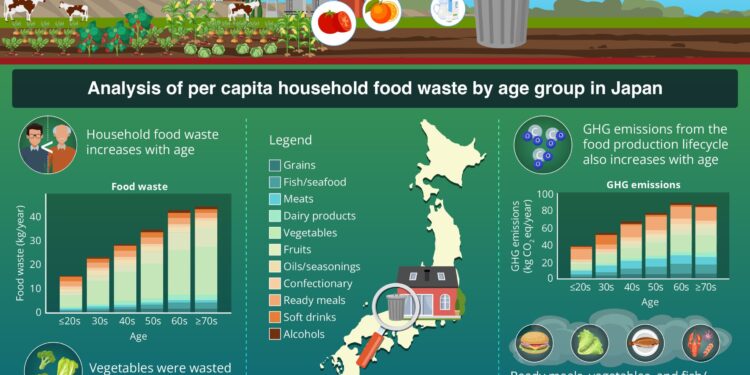Researchers studied the link between household food waste and various demographic and economic factors, revealing the complex role of age. Credit: Dr Yosuke Shigetomi of Ritsumeikan University, Japan
Producing food and delivering it to people’s plates involves a significant expenditure of energy and resources. Unfortunately, around a third of all food produced in the world goes uneaten and is thrown away. Therefore, to build sustainable societies, it is essential to minimize food waste.
In Japan, based on estimates reported by government institutions, an astonishing 2.47 megatons of food waste was generated by households in 2021, much of which was likely still edible. Japan therefore has considerable room for improvement in terms of reducing domestic food waste. The problem, however, is that little is known about the types of foods that contribute most to food waste, the greenhouse gas emissions associated with it, and whether Specific sectors of the population are more prone to food waste.
Now, a research team led by Associate Professor Yosuke Shigetomi of the College of Science and Engineering at Ritsumeikan University, Japan, with Asuka Ishigami of Nagasaki University, Associate Professor Andrew Chapman of the Kyushu University and Associate Professor Yin Long from the University of Tokyo, Japan decided to fill this knowledge gap.
Through a detailed analysis of food waste in Japanese households incorporating demographic and dietary trends, they established important links between the quantity and type of food waste, their associated emissions and their age. Their findings were published in Natural communications on October 21, 2024.
To conduct their analysis, the researchers gathered statistics on food consumption and waste from previously published surveys. The information allowed the team to determine the ratios between edible and inedible parts of more than 2,000 food products, as well as the physical quantity of household food waste for various food categories. Combining this data with food-related socioeconomic statistics, they explored how age and other factors affect the quantity and type of approximately 200 foods wasted.
It is worth noting that Dr. Shigetomi highlights Ishigami’s important contributions in this study. “Asuka Ishigami was my supervised student at my previous affiliation, Nagasaki University. Although she received her bachelor’s degree in 2022, she worked hard to collect all the fundamental data and conduct the initial analysis of this study through her thesis,” says Dr. Shigetomi. .
One of the most notable findings is that food waste per person appears to increase significantly with the age of the household head. The difference was quite surprising, as older households potentially produced almost twice as much food waste as households whose head was in their 30s. Vegetables are also the most commonly wasted food. Similarly, greenhouse gas emissions associated with food waste also increase with the age of the household head. In this case, however, vegetables, ready meals as well as fish and seafood were the main contributors.
Taken together, the findings highlight how age could be directly linked to food waste and associated greenhouse gas emissions. “The aging population would be one of the hidden but key factors to take into account when proposing strategies to reduce food waste directly generated by households,” notes Dr Shigetomi.
Additionally, identifying vegetables and meats as a major or minor source of food waste, but both as major sources of greenhouse gases, also highlights the importance of understanding which food categories contribute the most to these problems, which allows the development of more targeted interventions. and policies.
“It will be essential to pay greater attention to the food preferences and lifestyles of different generations, especially given the desire for a shift in diet towards vegetarianism to combat climate change,” adds Dr Shigetomi .
The results of this study will contribute to the development of effective strategies to reduce food waste and raise awareness of the environmental threat it poses. Educational campaigns could go a long way in helping people be more mindful of the food they eat, how they cook and store it, and how much of it ends up thrown away.
More information:
Yosuke Shigetomi et al, Reducing household food waste and the associated impacts of climate change in an aging society, Natural communications (2024). DOI: 10.1038/s41467-024-51553-w
Provided by Ritsumeikan University
Quote: Understanding the relationship between food waste, climate change and the aging population (October 21, 2024) retrieved October 21, 2024 from
This document is subject to copyright. Apart from fair use for private study or research purposes, no part may be reproduced without written permission. The content is provided for informational purposes only.



